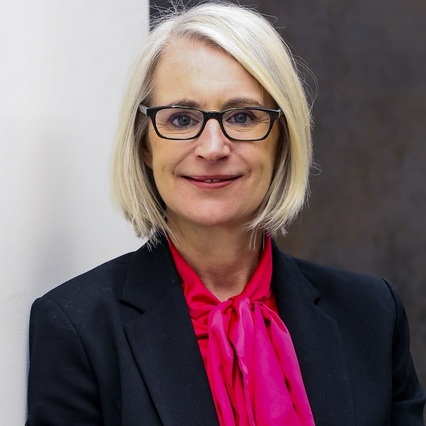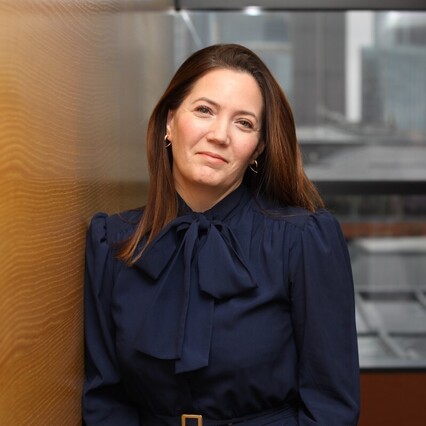
Juliet Hardingham

Tara Waite
Tara Waite (nee Kneafsey) has over 20 years of experience in financial services both in the UK and internationally. She is currently CEO of multi-award-winning lender Premium Credit Ltd, a PE-backed (Cinven) business.
Prior to this, she was Group CEO of Wonga Group Ltd, an international consumer lending business operating in Europe and South Africa, leading it through its turnaround and regulatory authorisation in the UK.
Earlier in her career, she held several leadership roles at RSA Insurance Group, including Managing Director of the UK’s SME and Delegated Authority business, and CEO of RSA’s market-leading business in Latvia.
Tara began her career as a management consultant at Andersen and subsequently at Ernst and Young. She holds a Bachelor’s degree in Applied Physics from Trinity College Dublin, and a Master’s degree in Applied Physics. She is also a visiting Fellow at Oxford University’s SAID Business School.
Hardingham: You have been a CEO during this exceptional period of turmoil and change. What have you had to enhance in how you lead within your organisation?
Waite: We moved very quickly to working from home to protect our colleagues and ensure we maintained our service for partners and customers. Communication became an even higher priority than it was before with all stakeholders.
We switched some of our face-to-face sessions, like quarterly town halls, to virtual, and we introduced a new set of remote live events, including leadership calls, business spotlights, and a regular all colleague email briefing. The proportion of time spent communicating rose exponentially to compensate for working remotely and to ensure people felt connected.
Hardingham: During this period of change how have the expectations from your stakeholders (particularly the PE owners) around communication altered?
Waite: All stakeholders required increased communication and that included our PE owners, who were focused on reviewing all their portfolio companies to understand who had been adversely impacted and who had not. Clearly, during this period of global uncertainty, they required more from me, and I upped my communication with them to make sure we were on the same page.
I required more of their time as much as they required more of mine. This was the pattern for the first two or three months and then it returned to a more BAU level of activity.
Hardingham: With trust in government and the media at an all-time low, companies have emerged as the most trusted institution in 2021. How have you and your leadership team maintained the trust and motivation of your employees? What have been the challenges?
Waite: Overall, it has been easier to wrap arms around the organisation than initially expected, and this is because we were working in an environment where our technology was fit for purpose. We sent all our people home with their entire office set up, but also made allowance for those colleagues who couldn’t work effectively by providing a safe environment in the office.
Both the leadership and colleagues had to adapt styles to work effectively. We agreed on clear rules of engagement, for example, when running video meetings, we asked everyone to switch cameras on to improve engagement. We introduced a lunchtime corridor with no meetings scheduled to give colleagues some quiet time to focus, take a lunch break, or get out for a walk. We introduced a slightly earlier finish on a Friday afternoon for colleagues who had gone the extra mile during the week and had closed their work.
Like many organisations, the circumstances challenged us to think about our office space and where we were based. We had lots of colleagues traveling to our offices, which was convenient for some people but not others. Working remotely has democratised location for the whole organisation, and it has allowed us to not feel slavishly attached to one place.
Finally, regular communication remains a top priority for us. In the first five months of the year, we had a weekly all-staff live event. This has now been reduced to fortnightly, but we will continue to do this post-pandemic. We repeat messages that we give, and this provides people with structure, we give people a sense of what's going on in the world, what does it mean for our customers, partners, and colleagues, what are our plans, and so on. These sessions, including a ‘Question & answers’ section, give our people the tools to comment, challenge or ask for help.
Hardingham: Are there aspects/issues that you feel PE/VC should be paying more attention to during this crisis and looking ahead? Would it be different in a listed or privately owned company?
Waite: I worked in venture capital before I worked in private equity and there are always crisis scenarios of one type or another to work through, though the global pandemic has been extreme and unique. In my experience, the individuals and the companies I've worked with have been very hands-on as shareholders and board members during a crisis, and I think that's a healthy thing.
In larger corporates, stakeholders around the board are much more hands-off and it's much more governance and controls led. Sometimes during a crisis, the more willing you are to roll your sleeves up to solve problems the better. If I needed daily meetings for a week with my board, they would have been there at whatever time I required. For me that work ethic, style and willingness to stand shoulder to shoulder with management is important.
My experience has only been positive with excellent support, and I cannot think of anything that would need to change. When you are a CEO of a company, you are hired to do the job. Their job is to make sure that within the portfolio, you are performing the way they need you to, and they are there to be a supportive collaborative shareholder. I don't expect them to provide guidance to me on how to lead my business and how to do my job as that what’s I’m here for.
Hardingham: What do you think is key to ensuring an effective working relationship between the PE Firm and you, alongside the Executive team, in running the company and aligning to the PE firm’s objectives?
Waite: I think you would be crazy to get into a role working as a CEO for either a venture capital company or a private equity firm without agreeing on the fundamentals of what they expect of you. Those tend to be financial, as they are paying you to do the job, but what comes with that, is the expectation that you fill the balanced scorecard of activity as how you deliver those results.
They don’t expect you to be 100% cost-based or growth-focused; they don’t ask you to be that narrow. If you are delivering their expectations, they expect you to be broad in how you do it. They are interested and engaged at the Board level in all the things that you do, but their job is not to be in the weeds.
I think CEOs can ‘come a cropper’ where they are not aligned on the financial delivery, so this becomes a problem area from the outset. Of course, if circumstances change as they did for most during the pandemic, it would be very unfair for a VC or PE house to expect the CEO to deliver the original business plan. If that understanding is there, and you are communicating what’s Covid and what’s not, in my experience, both sides can get on the same page.
Hardingham: You have a substantial employee base with the majority currently working from home. How are you planning your workspace and ways of working for when restrictions have been lifted?
Waite: Since we decamped from the office, we have been thinking about our delivery for customers and partners and how we might take the opportunity to revisit our office model. Whilst there is a risk to colleagues, and our performance remains strong, we continue to operate from home as the standard.
Like many organisations, we have a team working up scenarios that reflect the need of the business, our people, and wider environmental factors, including government regulation. We are erring on the side of caution, meaning that the vast majority of meetings are virtual. We have started to reintroduce face-to-face sessions, for example, the board and some collaborative sessions- whilst observing practical precautions.
For us, live events will always be virtual because it's so much easier to get everyone together using technology, but we will aim to bring everyone together a couple of times each year to socialise together and get to know each other better.
In the new world, there will continue to be a fair chunk of time working from home. How much? That's a very difficult question to answer. Some meetings will mandate colleagues to come together, whilst others are more efficient run through a Teams call. Ultimately, we’ll use all the options available to ensure we keep delivering against our plan.
Hardingham: There is enhanced discussion around employee wellbeing which of course includes you. How have you maintained your own wellness and resilience over the last 18 months?
Waite: Being clear on how we work together, how we handle meetings or communicate is crucial, and the ways of working that I have put in place for my colleagues is as much for them as it is for me.
For example, with my executive team, I’ve found that a regular slot in my diary for ‘social’ time together has been beneficial for us all. Since March 2020, we’ve had downtime each week to relax together over drinks and not talk about work.
The current model and ways of working have also had personal benefits for many at Premium Credit. A personal game-changer is being able to do my fitness when I used to be commuting. Working from home has literally changed my life. Others have used the time saved to study or spend time with their families.
I’ve believed in a strong and balanced rhythm since I became a CEO 13 years ago, to help me to do my job better and reduce the pressure during the week. The principle hasn’t changed during the pandemic coupled with remote working- it has accentuated the need for good structures and great communication.
To learn more about this interview or Boyden's Private Equity & Venture Capital practice in the United Kingdom please contact Juliet Hardingham




